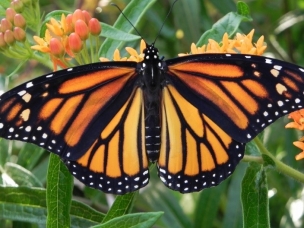 By Miriam Raftery
By Miriam Raftery
Photo: Monarch butterfly; cc via Bing
July 23, 2022 (San Diego) - Monarch Butterflies have been declared an internationally endangered species by the International Union for Conservation of Nature (IUCN). The group has placed monarchs on their Red List and warns that the beloved orange and butterflies could become extinct unless actions are taken to protect them.
The organization estimates the native population of monarch butterflies has shrunk by between 22% and 72% over the past decade, and the western population has declined by 99.9% between the 1980s and 2021 -- putting it at the greatest risk of extinction.
The U.S. Fish & Wildlife Service, however, has not yet added monarch butterflies to the federal endangered species list.
Monarch butterflies migrate over 2300 miles each year, from Canada to Mexico. Groves of trees covered in fluttering orange butterflies has long been a spectacular site for western coastal residents along the migration route.
Reasons for the drastic decline in Monarch populations has been attributed to climate change, loss of habitat and use of glyphosphate herbicides on crops such as soybeans and corn.
Alarmed by the decline, many backyard gardeners have tried to help by planting milkweed, the host plant required for Monarchs to reproduce.
But now California has banned a species of non-native milkweed over concerns that spores are harmful to the butterflies.
To save the Monarch butterflies from extinction experts at the Xerces Society recommend these steps be taken:
- Protecting and managing wintering, summer breeding and fall migration sites for Monarchs,
- Restoring breeding and migratory habitat; and
- Protecting monarchs and their habitat from pesticides.
You can help by planting native milkweed in your yard or garden. Native milkweed is available at many local nurseries and at the Water Conservation Garden at Cuyamaca College here in East County. Be sure the milkweed is a variety native to California.
You can also write to your Congressional representative to ask support for the Monarch Action, Recovery, and Conservation of Habitat Act.







Recent comments